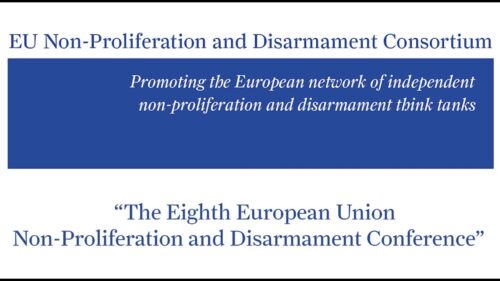 The annual conference of the EU Non-Proliferation and Disarmament Consortium (EUNPDC) took place in Brussels on November 10–11, 2025. The Consortium — in cooperation with SIPRI, FRS, IAI, IISS, PRIF, and VCDNP — brought together high-level experts from politics, academia, and international organizations. The program included keynotes by IAEA Director General Rafael Grossi and UN Disarmament Affairs Representative Izumi Nakamitsu, as well as panels on nuclear arms control, conventional arms control, regional security dynamics (East Asia, Middle East, South Asia, Ukraine), space security, the Biological Weapons Convention, emerging technologies (AI, autonomous weapons, synthetic biology), and diplomatic risks and efforts ahead of the 2026 Non-Proliferation Treaty Review Conference.
The annual conference of the EU Non-Proliferation and Disarmament Consortium (EUNPDC) took place in Brussels on November 10–11, 2025. The Consortium — in cooperation with SIPRI, FRS, IAI, IISS, PRIF, and VCDNP — brought together high-level experts from politics, academia, and international organizations. The program included keynotes by IAEA Director General Rafael Grossi and UN Disarmament Affairs Representative Izumi Nakamitsu, as well as panels on nuclear arms control, conventional arms control, regional security dynamics (East Asia, Middle East, South Asia, Ukraine), space security, the Biological Weapons Convention, emerging technologies (AI, autonomous weapons, synthetic biology), and diplomatic risks and efforts ahead of the 2026 Non-Proliferation Treaty Review Conference.
Timon Dörnfeld, research associate and doctoral student, represented PEASEC at the EUNPDC25 with a scientific perspective from computer science and physics.
Nuclear Arms Control in Transition
The discussion on nuclear arms control highlighted fundamental differences of opinion. While Elena Sokova (Executive Director, Vienna Center for Disarmament and Non-Proliferation) emphasized the inherent risks of deterrence logic, Stephen Lillie (Director for Defense and International Security, Foreign, Commonwealth Development Office, London) and Guillaume Ollagnier (Director for Strategic Affairs, Security and Disarmament, Ministry of Foreign Affairs of France, Paris) continued to advocate a classic deterrence doctrine for current times. Particularly problematic would be the destabilization caused by new weapons systems with unclear purposes — deterrence or actual use? This ambiguity would undermines strategic stability.
Emerging Technologies and Future Arms Control
The panel on emerging technologies provided perhaps the most critical insights of the conference. Elke Schwarz (Professor of Political Theory, Queen Mary University of London) deconstructed the AI hype in a military context: Many AI applications prove to be far less effective in real combat conditions than marketed in controlled laboratory environments. Furthermore, Venture capital investments have advanced the development of technologies and prioritized technical scalability over societal utility. Armed conflicts and war would be viewed too uncritically as accelerators of technological progress.
Branka Marijan (Senior Researcher, Project Ploughshares, Hamilton, Canada) added to this perspective: Companies such as Palantir are using Ukraine as a testing ground for their systems and products. The call for regulation of lethal autonomous weapons systems (LAWS) should have been made “yesterday.”
Cyril Martel (Head of the Biosecurity Division, Danish Centre for Biosecurity and Biopreparedness, Copenhagen) emphasized the underestimated threat posed by the weaponization of synthetic biology. The combination of CRISPR/Cas and Large Language Models would accelerate and lower the barriers to the development of biological weapons, while at the same time making traceability significantly more difficult.
The Future of Non-Proliferation and Disarmament
The intergenerational dialogue between senior and early-career researchers brought together critical approaches and scientific optimism. Fer Avar (PhD Researcher in International Security, University of Antwerp) addressed the issue of the concentration of power in private platforms and their responsibility as infrastructure owners. Eleonora Neri (International Relations Specialist, Vienna Institute for Global Studies, MODUL University) emphasized the importance of cooperation over competition in science and institutions: Peace should not defined by the absence of conflict, but rather “peace is the absence of borders.” The central question: Are researchers merely observers, or must we take responsibility? Wilfred Wan (Director, Weapons of Mass Destruction Programme, Stockholm International Peace Research Institute) argued for the latter — an important impetus for the community in the current times.
Outlook for the NPT RevCon 2026
Olamide Samuel (Network and Engagement Specialist, Open Nuclear Network, Vienna) contributed a global perspective: The Global South is closely observing the open demands for nuclear weapons in European and Western countries. States of the Global South increasingly see themselves threatened, e.g., by US foreign ambitions, and in this context conclude that acquiring their own nuclear weapons would stabilize their sovereignty and influence globally. This tension underscores the urgency of using the 2026 Nuclear Non-Proliferation Treaty Review Conference to make substantial progress.
Conclusion
In her closing statement on the occasion of the 80th commemoration of the bombings of Hiroshima and Nagasaki, Izumi Nakamitsu (High Representative for Disarmament Affairs, United Nations Office for Disarmament Affairs, New York) aptly stated: Weapons do not provide security — security is created through international cooperation between institutions based on humanitarian values and international humanitarian law.
The conference showed that critical analyses of power, market, and military logic are indispensable. The coming months leading up to the NPT RevCon will be crucial for securing nuclear disarmament for the next few years.
